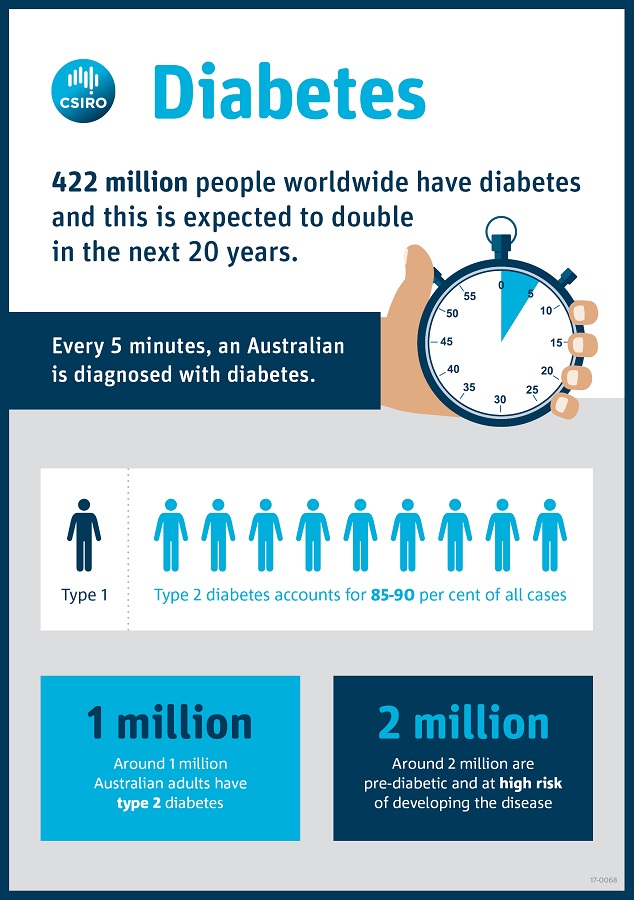
Ginger-soy beef skewers with zucchini noodle salad image
Ginger-soy beef skewers with zucchini noodle salad: one of the many tasty low-carb diet options
The obesity epidemic in Australia is resulting in an alarming increase in the prevalence of type 2 diabetes.
Approximately 1 million Australian adults have type 2 diabetes and it is estimated over 2 million people are pre-diabetic and are at high risk of developing this disease.
 That’s around 13 per cent of our entire population! It’s easy to see why our health researchers have made it a priority to discover better ways to prevent and manage this serious disease.
That’s around 13 per cent of our entire population! It’s easy to see why our health researchers have made it a priority to discover better ways to prevent and manage this serious disease.
To better understand the importance of diet when managing type 2 diabetes, we undertook one of the largest and complex diet and lifestyle intervention studies in Australia, in collaboration with the University of Adelaide, Flinders University and the University of South Australia.
The two year study compared different dietary approaches for managing type 2 diabetes: a low carbohydrate, high protein, high healthy fat diet and a traditional high-unrefined carbohydrate, low fat diet. All participants also participated in a supervised exercise program.
Significant results
One of the most significant findings for those people who followed the low carbohydrate diet was a staggering 40 per cent reduction in the amount of diabetes medication they required, twice as effective as the high carbohydrate, low fat diet. The low carbohydrate diet was also three times more effective at reducing blood glucose spikes across the day.
The results of the study is creating a paradigm shift in our thinking about how we should manage type 2 diabetes.
For the millions of Australians who are overweight and have or at risk of developing type 2 diabetes, this study could make a real difference to the diet and lifestyle decisions they make.
We are working hard to provide a clear and comprehensive overview of the science and benefits behind the low carbohydrate diet – so we’ve developed the CSIRO Low-Carb Diet book. The book provides an easy to follow, structured meal plans including recipes, clear descriptions of low-carb versus high-carb foods, shopping lists and a complete exercise plan.


23rd September 2020 at 4:51 pm
Just bought the book I have type2 diabetes but struggling to understand what 1unit of dairy is equivalent to in grams or mls alongside carbs, protein etc..
19th April 2019 at 9:31 am
I’d recommend low-carb to everyone and especially the newly diagnosed diabetics of which I’m one. Many things have normalised in ~2 months since low-carb dieting : these include cholesterols, liver (was moderate-severity fatty liver), all liver enzymes. I’m taking 1 blood pressure tablet and metformin 500×2 daily, and they’re under control. I’m motivated to get further improvements, and to get off medication.
Why I write this ? Because I want the health authorities and medical profession to denounce refined carb as the Good … and lead the public to refined carb is in fact the Bad.
On a personal note, I feel very hurt to see an elderly diabetic & heart disease friend (with fbg of 8mmol) in her hospital bed being fed and eating breakfast with bread / cereal / canned fruit / orange juice …. there’s plenty of sugar in that brekky ! She died a few days later.
I mean …. I think back in all those decades before her death how much wrong and harm the Health authorities and profession had done to her through maltreatment by drug and inappropriate nutrition. Wake up Australia Wake up World !!
5th June 2017 at 7:43 pm
Rosemary, I see that there have been no practically helpful comments, so allow me to relate our own experience for discussion with your dietitian:
# First we used a ‘keto-calculator’ to define our personal needs – https://keto-calculator.ankerl.com/
# For two weeks we used a carb-converter on the internet to check each days carb intake [ https://www.sparkpeople.com/myspark/loginpage.asp ]. When we added in EVERYTHING we found that we were over the 50gms – culprits were milk in the coffee; lemon juice or balsamic in the salad dressing; croutons in the salad, noodles in the packet soup, high starch in carrots, turnips, etc.
# We also found that our non-starch vegetables made up less than half of our total food intake and that we were eating too much protein (which the body can convert into glucose)
# Once we made the corrections I lost weight rapidly. My wife also lost weight, but VERY slowly. It seems that this can happen (with post-menopausal women?), but after a year, sinning for a few weeks at a time, she had lost 10 kgs.
How this provides input for your next dietitian visit.
5th June 2017 at 7:45 pm
My apologies, what I meant to write was that over the first 6 weeks my wife lost weight very slowly, but the loss accelerated after that
9th May 2017 at 10:27 am
I’ve been following the CSIRO Low-Carb Diet for two weeks and exercising more than the required times, but am not losing any weight. I have followed the 6000kJ diet requirements and am feeling a little disillusioned. What can I do?
15th May 2017 at 2:14 pm
Hi Rosemary,
We passed your question on to the scientists and this was their response:
“We certainly understand that everyone has a different response to dietary patterns and it is difficult to give specific and individualised dietary advice over the internet.
CSIRO can’t provide clinical services to the community, so to get the best out of the CSIRO low carb diet plan, we recommend you seek the clinical services of an Accredited Practising Dietitian with experience in low carbohydrate diets and diabetes to help tailor the plan to your personal needs. Sometimes having someone re-evaluate your needs with you and making some small changes can provide great outcomes.
An Accredited practicing dietitian will take into account your lifestyle, food budget, gender, height and weight, but also if you are on any medications that may influence your success on the plan.”
Cheers,
Eliza
CSIRO social media
30th June 2017 at 6:54 am
Thank You for this question Rosemary, I have been following a low carbohydrate program for over 2mths now and have only lost 1kg. I think that ‘age & stage’ have a lot to do with it. Sadly I think that I will also have to give up dairy before I see a difference, even though I restrict it to milk in my tea.
Pingback: Big myths about low carb diets – Australia News & Buzz